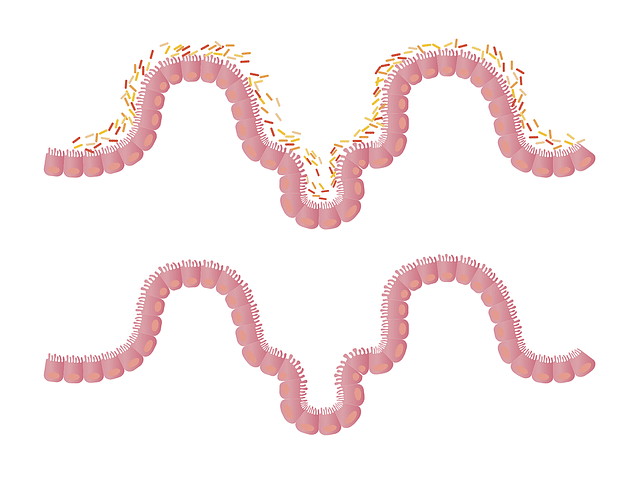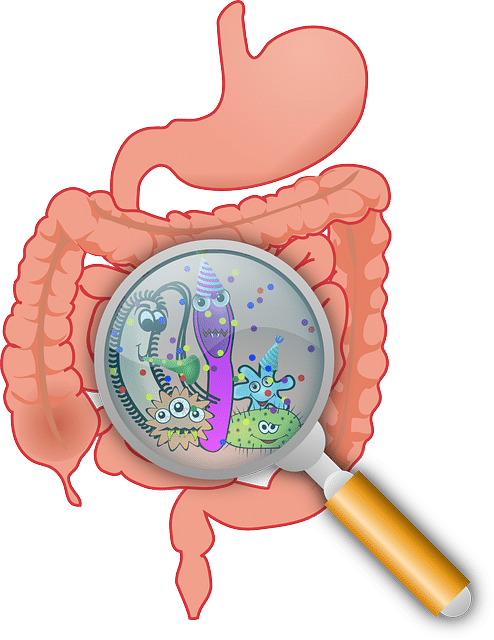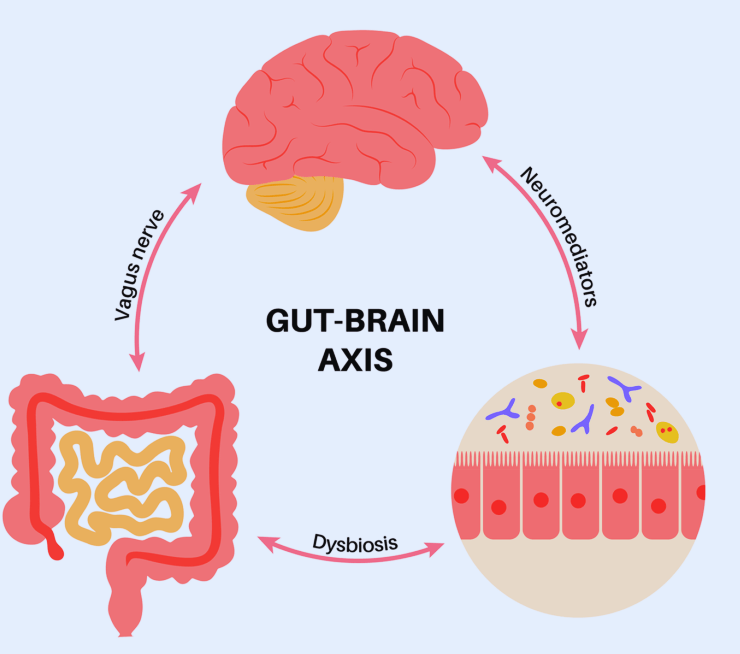Unveiling the Influence of Gut Microbiota

Beyond its conventional role in digestion, the gut harbors a diverse community of microorganisms known as the gut microbiota. Recent investigations have illuminated their profound impact on mental health, showcasing their active involvement in shaping cognitive functions and emotional well-being. These microbial populations communicate with the brain through intricate pathways, highlighting their significance in our overall health.
The Intersection of Gut Health and Mental Well-Being

Recent studies have underscored the pivotal role of gut microbiota in mental health outcomes. Disturbances in the composition and diversity of these microbes have been implicated in various psychiatric disorders, including depression, anxiety, and neurodevelopmental conditions like autism spectrum disorder. Such findings emphasize the intimate connection between gut health and emotional resilience.
Unraveling Mechanisms Along the Gut-Brain Axis

Scientists are delving into the complex mechanisms underlying the gut-brain axis, elucidating how gut microbiota influence mental health. From modulating neurotransmitter production to regulating inflammation and stress responses, these microorganisms wield a multifaceted influence on brain function. Additionally, emerging research suggests that microbial metabolites may directly impact neuronal activity, further bridging the gap between gut health and mental well-being.
Exploring Therapeutic Frontiers

Armed with these insights, researchers are exploring innovative therapeutic interventions aimed at leveraging the gut microbiota to enhance mental wellness. Probiotics, prebiotics, and dietary interventions offer promising avenues for restoring microbial balance and alleviating symptoms of mental illness. Furthermore, experimental approaches like fecal microbiota transplantation (FMT) hold potential for treating psychiatric disorders, signaling a paradigm shift in personalized medicine approaches.
The Role of Diet and Lifestyle
Diet and lifestyle factors play a crucial role in shaping the composition and function of the gut microbiota. High-fiber diets, rich in fruits, vegetables, and whole grains, promote the growth of beneficial bacteria and support a healthy gut environment. Conversely, diets high in processed foods and sugar can disrupt microbial balance and contribute to inflammation and oxidative stress, predisposing individuals to mental health disorders. Lifestyle factors such as stress management, adequate sleep, and regular physical activity also impact gut health and overall well-being, highlighting the importance of holistic approaches to mental wellness.
Precision Medicine Approaches
Advancements in technology and data analytics are enabling the development of precision medicine approaches to gut microbiota modulation. By leveraging genomic sequencing, metabolomics, and machine learning algorithms, researchers can identify microbial signatures associated with specific mental health conditions and tailor interventions to individual patients. This personalized approach holds promise for improving treatment outcomes and reducing the burden of mental illness on individuals and society as a whole.
Community Engagement and Education
Raising awareness about the link between gut health and mental well-being is essential for promoting proactive approaches to mental health care. Community engagement initiatives, educational campaigns, and public health interventions can empower individuals to make informed choices about diet, lifestyle, and healthcare practices that support gut microbial balance and promote mental wellness. By fostering a culture of prevention and self-care, we can work towards a future where mental health disorders are effectively managed and prevented through holistic approaches that address the root causes of illness.
Ethical Considerations and Future Directions
As research on gut microbiota and mental health progresses, it is crucial to consider ethical implications and potential unintended consequences. Safeguarding patient privacy, ensuring informed consent, and mitigating risks associated with experimental interventions are paramount. Additionally, fostering equity and accessibility in healthcare delivery and research participation is essential for addressing disparities in mental health outcomes. Moving forward, interdisciplinary collaboration, ethical governance frameworks, and community engagement will be key to advancing our understanding of the gut-brain axis and translating scientific discoveries into tangible benefits for individuals and society.
Global Collaboration and Knowledge Sharing
Addressing the complexities of gut microbiota and mental health requires a global effort involving collaboration and knowledge sharing among researchers, healthcare providers, policymakers, and community stakeholders. International research consortia, collaborative networks, and knowledge exchange platforms facilitate the sharing of data, expertise, and resources, accelerating progress and promoting innovation in the field. By fostering a culture of collaboration and open science, we can maximize the impact of research efforts and address the multifaceted challenges posed by gut microbiota dysbiosis and mental illness on a global scale.
Policy Implications and Healthcare Integration
The integration of gut microbiota research into healthcare policy and practice has the potential to revolutionize mental health care delivery. Policymakers, healthcare providers, and public health officials must prioritize investments in research infrastructure, education, and healthcare interventions that promote gut microbial balance and support mental wellness. By advocating for evidence-based policies and initiatives that address the social determinants of health and promote preventive approaches, we can create supportive environments that nurture gut-brain health and foster resilience against mental illness.
Holistic Approaches to Mental Wellness
Holistic approaches to mental wellness emphasize the interconnectedness of physical, mental, and emotional well-being. By addressing the underlying factors that contribute to mental health disorders, such as gut dysbiosis, inflammation, and oxidative stress, holistic interventions aim to promote overall wellness and resilience. Integrative therapies, including mindfulness meditation, acupuncture, and herbal medicine, complement conventional treatments and support the body’s natural healing mechanisms. By adopting a holistic approach to mental wellness, individuals can cultivate a sense of balance, harmony, and vitality in their lives.
Environmental Influences on Gut Health
Environmental factors play a significant role in shaping gut microbiota composition and function. Exposures to pollutants, pesticides, and industrial chemicals can disrupt microbial balance and contribute to gut dysbiosis. Additionally, lifestyle factors such as diet, stress, and antibiotic use influence the gut environment and susceptibility to mental health disorders. By promoting environmental stewardship, sustainable agriculture, and toxin-free living, we can create healthier environments that support gut-brain health and mental wellness.
Cultural Perspectives on Gut Health
Cultural perspectives on gut health vary widely across different societies and communities. Traditional diets, culinary practices, and healing traditions reflect unique cultural beliefs and values related to food, digestion, and health. By honoring and preserving cultural traditions that promote gut health, we can harness the wisdom of diverse cultures to inform holistic approaches to mental wellness. Culturally sensitive healthcare practices and community-based interventions can bridge cultural divides and promote health equity for all.
The Gut-Immune System Axis
The gut-immune system axis plays a crucial role in maintaining gut homeostasis and protecting against microbial invaders. Dysregulation of the gut-immune system axis is implicated in various inflammatory and autoimmune conditions, including inflammatory bowel disease (IBD) and rheumatoid arthritis. Emerging research suggests that immune dysregulation in the gut may also contribute to mental health disorders, highlighting the interconnectedness of gut health, immune function, and mental wellness. By supporting immune health through dietary interventions, probiotics, and lifestyle modifications, we can bolster resilience against both physical and mental health challenges.
Technological Innovations in Gut Health Monitoring
Advancements in technology are revolutionizing our ability to monitor and modulate gut health in real-time. Wearable devices, biosensors, and mobile apps enable individuals to track dietary intake, gut microbiota composition, and physiological parameters related to gut function. These technologies empower individuals to take proactive steps towards optimizing gut health and preventing mental health disorders. Furthermore, digital health platforms facilitate remote monitoring and telehealth consultations, expanding access to gut health resources and support services for diverse populations.
The Gut-Brain-Skin Axis: Exploring Connections
The gut-brain-skin axis represents an intricate network of communication between the gut, the brain, and the skin. Emerging research suggests that gut microbiota play a role in skin health and dermatological conditions such as acne, eczema, and psoriasis. Moreover, psychological stress and emotional well-being can influence gut permeability and immune function, impacting skin health and appearance. By addressing imbalances along the gut-brain-skin axis through dietary modifications, stress management techniques, and skincare interventions, individuals can promote holistic wellness and radiant skin from the inside out.
Psychosocial Determinants of Gut Health
Psychosocial factors, including stress, trauma, and social support, exert profound effects on gut health and mental well-being. Chronic stress can disrupt gut microbial balance, impair immune function, and increase susceptibility to mental health disorders. Conversely, social connections, emotional resilience, and supportive relationships can buffer against the negative effects of stress and promote gut-brain health. By fostering nurturing environments and fostering social connections, we can cultivate resilience and promote mental wellness for individuals and communities alike.
A Lifespan Approach to Gut Health and Mental Wellness
Gut health and mental wellness are influenced by factors across the lifespan, from infancy to old age. Early-life experiences, including birth mode, breastfeeding, and early nutrition, shape the developing gut microbiota and establish lifelong patterns of health and disease. Throughout adulthood, lifestyle factors such as diet, exercise, and stress management continue to impact gut health and mental well-being. In later life, age-related changes in gut microbiota composition and function may contribute to cognitive decline and neurodegenerative diseases. By adopting a lifespan approach to gut health and mental wellness, we can support healthy aging and promote resilience across all stages of life.






